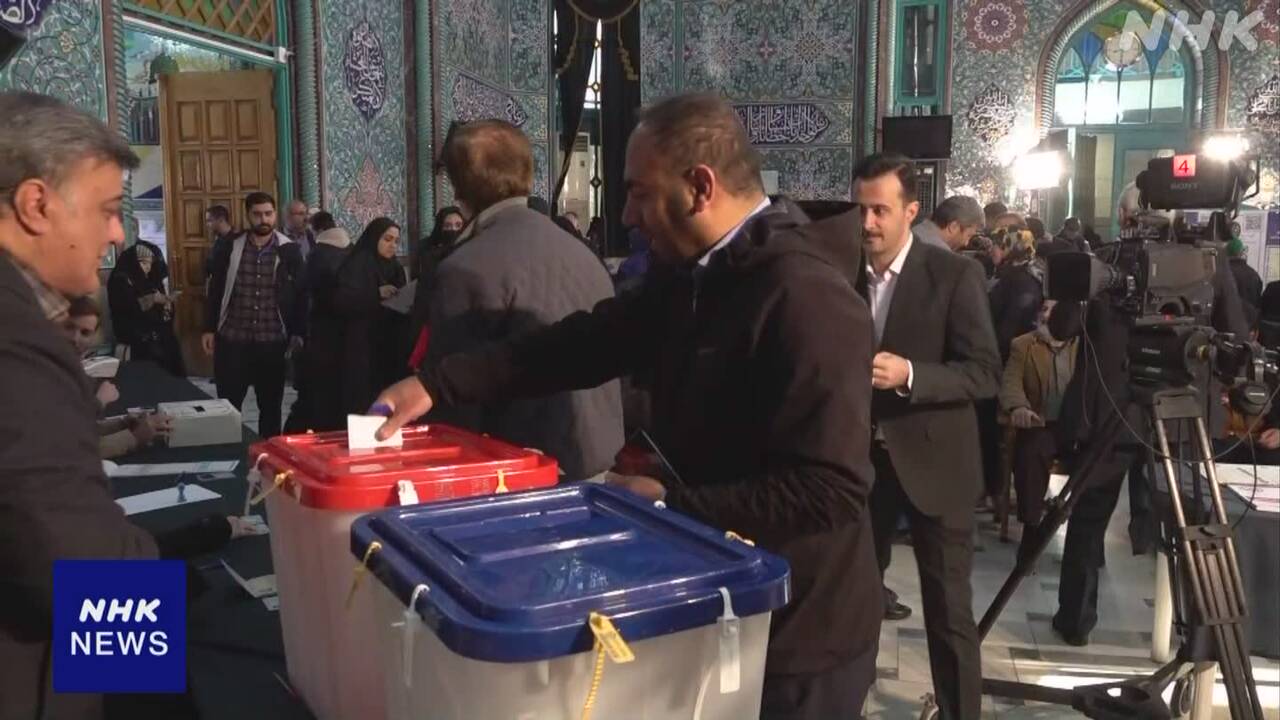Voting has begun for the parliamentary elections in Iran, which is in deep conflict with the West over the situation in the Palestinian Gaza Strip and Ukraine.
The focus is on whether hard-line conservatives who support the current administration's foreign and military policies will further expand their influence.
Voting for Iran's parliamentary elections, which are held once every four years, began on the 1st for 290 seats, and voters visited the mosque in the capital Tehran one after another to cast their votes.
Iran is
deepening tensions with the West, as it has been pointed out that it is providing drones to Russia, which continues its military invasion of Ukraine.In addition, Iran
continues to carry out attacks in the Gaza Strip in support of the Islamic organization Hamas. I strongly oppose Israel, which is in the country, and the United States, which supports it.
The focus of this election is whether the hard-line conservative factions, which hold a majority in parliament and support the foreign and military policies of the Raisi government that is at odds with the West, will further expand their influence.
Meanwhile, the agency that conducts the preliminary screening of candidacy has announced that one-quarter of those who have received applications were disqualified.
Those disqualified include politicians who criticized the government during demonstrations that spread over scarf-wearing practices in 2022, and many voters are considering not voting because they think the election is not fair. is shown.
Voting is scheduled to end at 11:30 pm on March 1st Japan time, after which vote counting will begin, and it is expected that it will take several days for the majority of votes to be counted.
One of the points of focus is “the expansion of the power of “hard-line conservatives””
In this parliamentary election, one of the focal points is how much the power of "hard-line conservatives" who are anti-American and anti-Israel has expanded, and how much influence it will have on Iran's foreign and military policies.
In the last election held four years ago, conservative hard-liners held more than 70% of the 290 seats in Iran's parliament, but this time there are ``reformist'' candidates who emphasize dialogue with the West. , many candidates were disqualified in the preliminary screening process, raising the prospect that hard-line conservatives will gain more seats.
Among the hard-line conservatives, a party that is more radical and is increasing its presence is the ``Permanent Front of the Islamic Revolution.''
It is characterized by its deep ties to Iran's elite military forces, and the fact that many of its members belong to it.
During the election period, Islamic jurists collaborating with the party repeatedly gave speeches at mosques and other places where many conservatives gather, urging people to vote, and they also set up a youth group to instill support among the younger generation. We are actively engaged in activities.
Alireza of the Permanent Front of the Islamic Revolution, who is running for election, said that over the situation in the Gaza Strip, Iran, which is backed by the Islamic organization Hamas, is deepening conflict with Israel and the United States, which supports it. Congressman Abbasi stressed that ``Iran's basic policy is to support the Palestinians. Compromise will bring nothing, and only resistance can bring them out of the dire situation they are facing.''
She went on to say that it is a false claim that Iran is causing chaos and instability in the region, and that the chaos will be resolved if the United States stops intervening. He claimed that the United States was responsible for this.
In the capital, Tehran, voices of support for the regime also raise concerns.
In the capital Tehran, some voices were heard supporting the government's position, but others were expressing concern about the growing presence of hard-line conservatives in Iran and the deepening conflict with countries such as the United States and Israel.
Regarding Iran's support for armed groups across the Middle East, including Hamas and Yemen's Houthi rebel group, the
42-year-old woman said, ``I am an Iranian citizen who supports the oppressed people of Palestine.'' I am proud of this and hope that the day will come when Israel will disappear from the map."
On the other hand,
a 52-year-old man said, ``I have no interest in Hamas when my own people are weakened by economic sanctions,'' and a
38-year-old woman said, ``I don't want to live such a painful life.'' "Iran should build relationships with many countries so that this situation can be resolved."
These regional conditions are also casting a dark shadow on business.
A curtain manufacturer with a factory on the outskirts of Tehran has been unable to reflect the soaring raw material prices due to inflation caused by economic sanctions from Europe and the United States in the selling prices of its products, and is facing financial difficulties.
Furthermore, concerns are growing over the deepening conflict between Iran and the United States over issues such as the situation in the Gaza Strip.
Sajjadi, the president of a curtain manufacturer, was pessimistic, saying, ``If peace does not come, the local economy will be in turmoil.At the moment, there are no signs that the economic situation will improve.''

